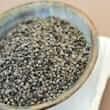Background
- The chaste tree is native to the Mediterranean and Central Asia. Its berries have long been used for a variety of abnormalities including "corpus luteum deficiency," mastalgia (breast pain), and menstrual abnormalities.
- Chasteberry has been shown to inhibit prolactin secretion by competitively binding to dopamine receptors. Available evidence suggests that chasteberry may be an effective treatment option for hyperprolactinemic (elevated serum prolactin levels) conditions, and premenstrual syndrome (PMS). Chasteberry does not appear to affect levels of luteinizing hormone or follicle stimulating hormone.
- Currently, clinical trials have found that treatment with chasteberry has been well tolerated with minimal side effects.
- The dried fruit of chasteberry plants has been used for thousands of years as a means of treating various ailments, ranging from impotence to breast pain. It was popular in ancient Greece and Rome to help promote celibacy. More recently, chasteberry has gained recognition for its success in alleviating some signs and symptoms of hyperprolactinemia and premenstrual syndrome. It is thought to have a normalizing effect on the menstrual cycle and has been used successfully to treat both amenorrhea (absence of menstruation) and menorrhagia (heavy menstruation).
References
Natural Standard developed the above evidence-based information based on a thorough systematic review of the available scientific articles. For comprehensive information about alternative and complementary therapies on the professional level, go to . Selected references are listed below.
- Atmaca M, Kumru S, Tezcan E. Fluoxetine versus Vitex agnus castus extract in the treatment of premenstrual dysphoric disorder. Hum Psychopharmacol 2003;18(3):191-195.
View Abstract - Berger D, Schaffner W, Schrader E, et al. Efficacy of Vitex agnus castus L. extract Ze 440 in patients with pre- menstrual syndrome (PMS). Arch Gynecol Obstet 2000;264(3):150-153.
View Abstract - Cahill DJ, Fox R, Wardle PG, et al. Multiple follicular development associated with herbal medicine. Hum Reprod 1994;9(8):1469-1470.
View Abstract - Damayanti M, Susheela K, Sharma GJ. Effect of plant extracts and systemic fungicide on the pineapple fruit- rotting fungus, Ceratocystis paradoxa. Cytobios 1996;86(346):155-165.
View Abstract - Gerhard I, Patek A, Monga B, et al. Mastodynon(R) bei weiblicher Sterilitat.Randomisierte,plazebokontrollierte klinische Doppelblindstudie . Forsch Komplementarmed 1998;5(6):272-278.
View Abstract - Halaska M, Raus K, Beles P, et al. [Treatment of cyclical mastodynia using an extract of Vitex agnus castus: results of a double-blind comparison with a placebo]. Ceska Gynekol 1998;63(5):388-392.
View Abstract - Jarry H, Leonhardt S, Gorkow C, et al. In vitro prolactin but not LH and FSH release is inhibited by compounds in extracts of Agnus castus: direct evidence for a dopaminergic principle by the dopamine receptor assay. Exp Clin Endocrinol 1994;102(6):448-454.
View Abstract - Jarry H, Spengler B, Porzel A, et al. Evidence for Estrogen Receptor beta-Selective Activity of Vitex agnus-castus and Isolated Flavones. Planta Med 2003;69(10):945-947.
View Abstract - Kubista E, Muller G, Spona J. [Treatment of mastopathies with cyclic mastodynia. Clinical results and hormonal profiles]. Rev Fr Gynecol Obstet 1987;82(4):221-227.
View Abstract - Loch EG, Selle H, Boblitz N. Treatment of premenstrual syndrome with a phytopharmaceutical formulation containing Vitex agnus castus. J Womens Health Gend Based Med 2000;9(3):315-320.
View Abstract - Merz PG, Gorkow C, Schrodter A, et al. The effects of a special Agnus castus extract (BP1095E1) on prolactin secretion in healthy male subjects. Exp Clin Endocrinol Diabetes 1996;104(6):447-453.
View Abstract - Milewicz A, Gejdel E, Sworen H, et al. [Vitex agnus castus extract in the treatment of luteal phase defects due to latent hyperprolactinemia: results of a randomized placebo- controlled double-blind study]. Arzneimittelforschung 1993;43(7):752-756.
View Abstract - Schellenberg R. Treatment for the premenstrual syndrome with agnus castus fruit extract: prospective, randomised, placebo controlled study. BMJ 2001;322(7279):134-137.
View Abstract - Sliutz G, Speiser P, Schultz AM, et al. Agnus castus extracts inhibit prolactin secretion of rat pituitary cells. Horm Metab Res 1993;25(5):253-255.
View Abstract - Wuttke W, Jarry H, Christoffel V, et al. Chaste tree (Vitex agnus-castus)--pharmacology and clinical indications. Phytomedicine 2003;10(4):348-357.
View Abstract







